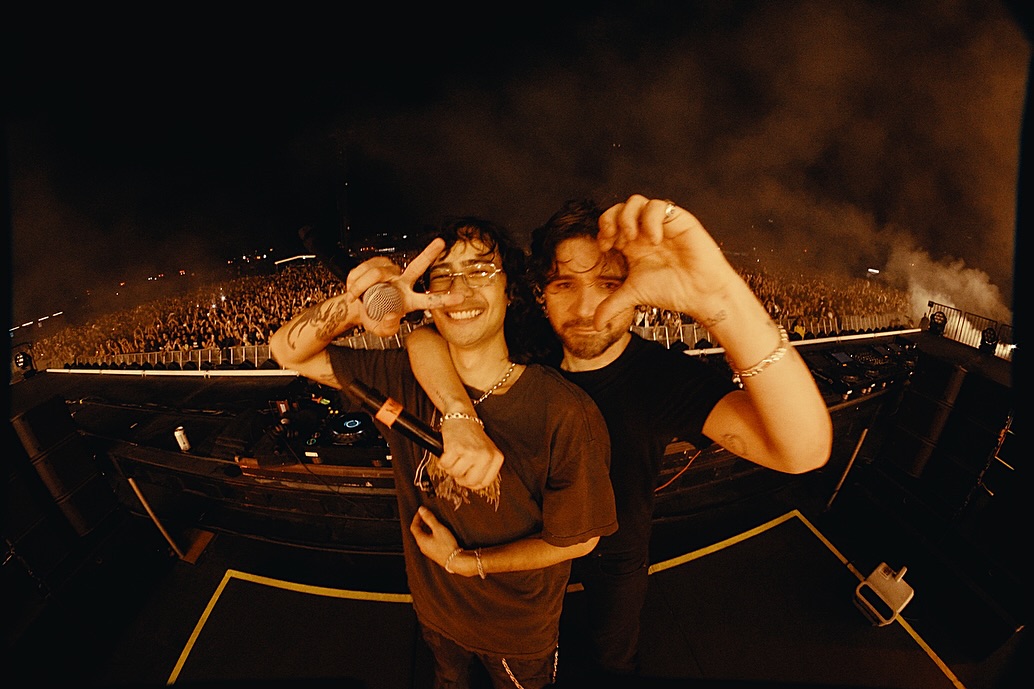Frances Quinlan is still getting used to performing with backing tracks. She didn’t want to take more than a guitar on tour, to make it easier to explore cities, but that means she has to keep up with the Macbook on stage next to her instead. “It’s like playing with the most merciless band in the whole world,” she tells the crowd at Chicago’s Tomorrow Never Knows Festival inside Sleeping Village earlier this month, weeks away from her solo debut. You could say Quinlan’s previous decade-plus of fronting Philly indie act Hop Along has been the polar opposite experience. She continues, “It’s so wild to get used to a structure and a group and say, ‘No, I’m gonna start over.” This week, the 33-year-old singer releases her first album under her own name, the sparse, synth-favoring Likewise.
Hop Along grew from Quinlan’s acoustic art-school solo project to its current quartet of her brother Mark on drums, Tyler Long on bass, and former Algernon Cadwallader member Joe Reinhart on guitar and keys. Across three albums, they’ve framed Quinlan’s pristine voice with rough, amplified punk performance. Quinlan turned to Reinhart, also her band’s go-to producer and engineer, to strip all that away on Likewise. “We didn’t think about our identities, musically, as we do in Hop Along where we’re both essentially guitarists,” she told Vulture ahead of the festival. “It was really fun to just let songs transform.”
Quinlan looks up to Thom Yorke and Jonny Greenwood, who took breaks from Radiohead to make projects like Yorke’s experimental Tomorrow’s Modern Boxes and Greenwood’s grand score to The Master, respectively, then came back with a more emotional sound on A Moon Shaped Pool. After this, she wants to make an “entirely different” Hop Along record — since, after all, the band hasn’t broken up. “The worst thing that could happen, in whatever your passion is, is for it to become routine and then boring,” Quinlan says. “Then it’s just a job.”
When did you know that this wasn’t Hop Along music?
Bark Your Head Off, Dog, the latest Hop Along record, was initially supposed to be eleven tracks. Two of the songs were “Went to LA” and “A Secret.” I actually started writing both of those in 2013, so they’re even older than the songs that were written for Bark Your Head Off. They were recorded during that session, in 2017, and then we realized that the album was going to be too long. After a lot of talk, I spoke with the band and made sure everyone was cool with the idea of me just taking the two solo songs, since they stood the most apart from the rest of the album.
I knew I wanted to do more songs with Joe [Reinhart]. We also knew that it didn’t need to be this guitar record — I mean, the guitar is not something I’m necessarily passionate about, it’s just the vehicle that I understand most at this point for writing and performing.
I read this interview where you talked about initially wanting to expand Hop Along from a solo project because of being jealous of seeing full ensembles on stage.
Right, absolutely.
And now it’s come back from that.
Quite honestly, I do miss the band. But in a few years, I’ll have been in Hop Along for half of my life; I started when I was 18. That’s a stretch of time. I wanted to be able to do more writing on the road as well. It starts to feel a little stagnant in Philly. I certainly, at the moment, have been romanticizing the idea of writing in places that are less familiar to me. So the goal is to write for Hop Along while I’m on the road. It’s interesting, because Hop Along is still active. This is the first time I’ve really had to navigate anything besides Hop Along.
“Rare Thing” is the one song that the whole band worked on. How was that process different?
With Hop Along, everybody has got a strong hand in the arrangement. We all tour so much, we all wanna enjoy what we’re playing. I will say, Mark and Tyler came up with their parts. I gave them references, and we went through a couple of times, but their parts came out so quick. Of course, I think that comes out of the benefit from having worked together for so long. But essentially, for Hop Along, we all edit very heavily, and songs tend to end up in very different places than where they began. For Likewise, I wanted to focus more on what could be done around the vocal and around what was already there. I wasn’t really worried about trying to make the songs the absolute very best they could be, I just wanted to translate what was there in the most compelling way.
What’s that recording at the beginning of “Piltdown Man,” and what was the purpose behind it?
That’s a field recording of this community center I was in on tour with Hop Along, actually. It was a very familiar sound of kids getting all of their energy out and parents chasing them, and it just felt right to record it then and use it later.
Being the first song on the album, it kind of sets a new tone for me. But also, lyrically, it gets into something I noticed on a lot of the songs: this almost braided essay of personal experience, and then these more factual things, like talking about the man they dug up. [Ed note: In 1912, an amateur archaeologist claimed he uncovered the skull of a new creature linking humans and apes in an area of England called Piltdown; it was debunked in 1953 as a combination of human and orangutan bones.]
One thing that I try to do is not make songs feel too insular. I like the idea of being able to move through scenes within songs, and then throughout a record. So bringing in bits of history, and then having abstract moments, and then having very real-time moments. I like how there’s no rules in narrative when it comes to songwriting.
The lines that stick with me are, oddly, the more factual things. Like, “Are pigeons cannibalistic?”
Those are all things that stuck with me too. They were things that either were said to me or that I read that just hung around, to the point where I thought, This must have some significance.
How did the cover of Built to Spill’s “Carry the Zero” get onto the album?
There was someone I used to date, we were working on trying to cover that one together, and it just wasn’t happening so I put it down for a while. And then a few years later, I tried it again on guitar, and for whatever reason, it just clicked much better. It was so much fun to play live, and I would include it regularly into my solo sets.
In early 2018, as we were waiting for Bark Your Head Off to come out, Joe and I did two songs, “Now That I’m Back” and “Carry the Zero.” For “Now That I’m Back,” we laid down the guitar as a scratch so that we would know the tempo and could lay everything down on top of it. Joe was like, “Let’s try a tremolo guitar, okay, let’s try some Rhodes [piano].” And then I was playing with these synths, and then shaker, and then some acoustic guitar, and then drums. Then we were recording the vocals, and Joe called me into the control room. He pressed play, and he took out the initial scratch guitar, so the Rhodes suddenly took control, and the tremolo guitar was just an accent. It completely transformed the song to me. And I was so excited by what taking something away could do that I said, “Let’s do them all this way.” So that’s what we did for “Carry the Zero” as well — let these other elements become the focal point, and then have the guitar just be this accent here and there.
Tell me about making the album cover.
It was important that the visual quality of this album stand separately from Hop Along, which is a challenge for me because I do the artwork for Hop Along as well. I just couldn’t get behind the idea of the cover being a photo of me, the permanence of that. So I thought a good compromise would be a drawn self-portrait — that would still be capturing a moment of time, but would be an interpretation that I could really get behind, because it was me drawing it rather than me trying to be understood by a photographer. It was kind of based off of the Joni Mitchell self-portrait for Clouds, except she looks so wise and knowing, and I was like, I don’t wanna look wise or cool, I should look nervous. That feels true.
How are you feeling about performing and starting a tour as Frances Quinlan, solo?
I’m excited. The last time I came out with a project and was playing that for people for the first time was over 10 years ago, when I think about it. I mean, Hop Along started in 2008. So it is a vulnerable thing, and I’m certainly navigating that sense of vulnerability. And of course, there’s the concern of how it will be compared to the band, which is a tall order to me. I hope that people will understand that it’s different, and I have to work on understanding that myself as well. It’s a challenge for me.
This interview has been edited and condensed for clarity.


